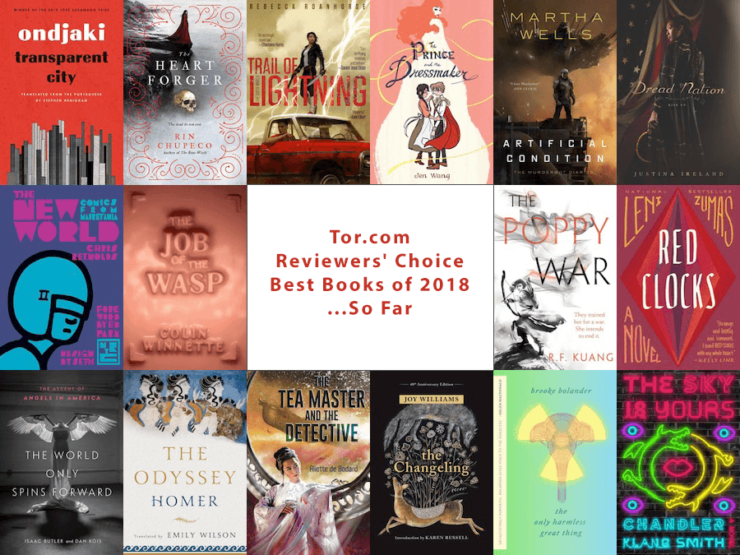We’re almost halfway through the year, and we have … a lot of favorite new reads already. Which is to say: We each picked a lot of best-books-so-far, and we almost all picked different books! This year’s highlights run the gamut: high fantasy, alternate history, space opera, reissues, YA fantasy, and a couple of things that aren’t even SFF (but so well-loved we had to include them anyway). We’ve got dragons, we’ve got translations, we’ve got witches and elephants and warriors, and we’ve got Murderbot. Naturally.
Take a gander at our favorites below, and leave your additions in the comments!
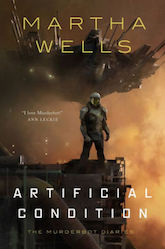 I love these reviewer round-ups, but narrowing down all my favorite books I’ve read so far down to just a few is a herculean task. I’ve read sooooo many great stories this year, with a strong queue already lined up for the fall and winter.
I love these reviewer round-ups, but narrowing down all my favorite books I’ve read so far down to just a few is a herculean task. I’ve read sooooo many great stories this year, with a strong queue already lined up for the fall and winter.
First up, Artificial Condition by Martha Wells, one of the most fun science fiction, robot-centric books I’ve ever read. The series is wonderfully diverse and full of action and adventure. Murderbot is the best and nothing will change my mind. I also really loved Brooke Bolander’s The Only Harmless Great Thing, a one-of-a-kind alternate history novella about sentient elephants and radium girls. This beautifully written story jumps between an elephant telling the story of a mammoth, the electrocution of Topsy the elephant, one dying woman bringing the exploitive system down around her, and one very frustrated scientist. And, of course, Dread Nation by Justina Ireland, which broke me into a million pieces over and over again. I laughed, I cried, and screamed, I squealed. I felt this story down to my core. Lastly, Witchmark by C.L. Polk, a strong contender for my favorite book of the year. Every single thing about it was delightful. It pained me to finish it, that’s how invested I was in the characters. So, so, so good!
Shout outs to Gods, Monsters, and the Lucky Peach by Kelly Robson, A Ruin of Shadows by L.D. Lewis, The Barrow Will Send What It May by Margaret Killjoy, Isle of Blood and Stone by Makiia Lucier, Freshwater by Akwaeke Emezi, and Trail of Lightning by Rebecca Roanhorse.
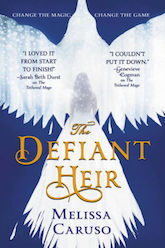 If we’re picking outstanding books from 2018, let’s acknowledge that a number of the most outstanding are novellas. For me, Aliette de Bodard’s The Tea Master and the Detective is chief among that number: a gorgeous take on a Sherlock Holmes & Dr. Watson-type story set in de Bodard’s glitteringly space-operatic Xuya continuity. The Tea Master and the Detective retains the compassion and the humour of the original Holmes, but de Bodard’s prose is deftly beautiful. Here a disgraced scholar-turned-private-investigator and a sentient ship form an awkward partnership when faced with a murder, and it’s fantastically good.
If we’re picking outstanding books from 2018, let’s acknowledge that a number of the most outstanding are novellas. For me, Aliette de Bodard’s The Tea Master and the Detective is chief among that number: a gorgeous take on a Sherlock Holmes & Dr. Watson-type story set in de Bodard’s glitteringly space-operatic Xuya continuity. The Tea Master and the Detective retains the compassion and the humour of the original Holmes, but de Bodard’s prose is deftly beautiful. Here a disgraced scholar-turned-private-investigator and a sentient ship form an awkward partnership when faced with a murder, and it’s fantastically good.
Melissa Caruso’s The Defiant Heir is a novel of magic, politics, friendship, and explosions, with excellent worldbuilding and brilliant characterisation. I rather adored it.
Stone Mad by Elizabeth Bear is a novella-length sequel to the awesome Karen Memory. It’s just as amazing, albeit in a different way. It’s part adventure story, like Karen Memory, but thematically, it’s really interested in the compromises that new relationships need to make in order to last. Karen has to come to terms with the idea that she’s no longer responsible for just herself: that her actions affect her partner, too. It’s a sweet, touching story, and deeply kind at heart. I loved it.
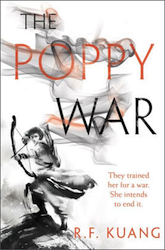 The Poppy War by R.F. Kuang
The Poppy War by R.F. Kuang
A blazing fantasy novel debut strongly influenced by the second Sino-Japanese War, this is the life story of a young peasant girl determined to make her own fate. That determination leads her to military school, contact with ancient magical powers, and into the teeth of a brutal, ineludible conflict. A dark, unflinching look at the personal and national costs of war and a compelling story.
Embers of War by Gareth Powell
A switch from the author’s recent monkey escapades, Embers of War is a big book that hits all of the buttons that make space opera one of my favorite genres—a cold war ready to turn hot again, Big Dumb Objects, interesting and thorny interstellar plots and problems, and a set of compelling characters (including, memorably, an excellently depicted ship AI) caught in it all.
Fire Dance by Ilana C Myer
A continuation of the world and characters from her debut, Last Song Before Night, Fire Dance is a lush, immersive, and on a line by line level, beautiful fantasy novel. The author’s command and evocation of language, description, and place transported me as a reader back into her world, and to new vistas within it.
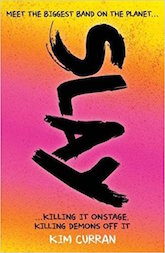 Kim Curran’s Slay is about a boyband that fights demons. Beyond this goofdorable premise, there’s also some properly sinister bad guys, a snarky Latinx professor (my fave), a ton of explosions, some romantic frisson, and a lot of implausible-to-impossible action sequences that’ll make you chuckle with glee. Written for kids (shelved in middle grade), it packs more than enough fun—and just enough emotional punch—to keep adults entertained as well.
Kim Curran’s Slay is about a boyband that fights demons. Beyond this goofdorable premise, there’s also some properly sinister bad guys, a snarky Latinx professor (my fave), a ton of explosions, some romantic frisson, and a lot of implausible-to-impossible action sequences that’ll make you chuckle with glee. Written for kids (shelved in middle grade), it packs more than enough fun—and just enough emotional punch—to keep adults entertained as well.
Drew Williams’ The Stars Now Unclaimed is a proper space spectacular, the love child of Destiny and Star Wars, raised by Firefly on a steady diet of Resident Evil. Kamali hops from planet to planet, saving super-powered kids for the Justified, a morally-ambiguous survivalist sect. It is silly and delicious, as Kamali leaps (often literally) from ninja ops to mahoosive fleet battles to running a gauntlet of rampaging zombie space raptors (no joke). The dialogue is snappy and the jokes are laugh out loud: an escapist, gleeful, explodey space opera.
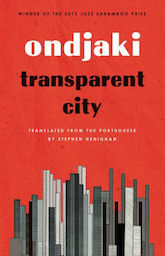 It’s been several months since I first read Ondjaki’s novel Transparent City, and it’s a novel that’s continued to rattle around in my skull and get under my skin. I’m being somewhat literal there: while it abounds with realistic elements, one of the novel’s central characters is also grappling with a peculiar transformation: his skin is turning transparent, and he’s gradually losing his connection to the earth around him. Ondjaki’s book blends harrowing realism with a fate that seems borrowed from mythology; the result is a resonant novel that perfectly shows how the realistic and fantastic can coexist to deeply moving effect.
It’s been several months since I first read Ondjaki’s novel Transparent City, and it’s a novel that’s continued to rattle around in my skull and get under my skin. I’m being somewhat literal there: while it abounds with realistic elements, one of the novel’s central characters is also grappling with a peculiar transformation: his skin is turning transparent, and he’s gradually losing his connection to the earth around him. Ondjaki’s book blends harrowing realism with a fate that seems borrowed from mythology; the result is a resonant novel that perfectly shows how the realistic and fantastic can coexist to deeply moving effect.
The 40th Anniversary edition of Joy Williams’s novel The Changeling does this as well, using aspects of the surreal and the weird to illustrate its protagonist’s sense of alienation from the world—specifically, the wealthy and reclusive family that she marries into shortly before the horrific death of her husband. Williams utilizes the language of fairy tales—stolen children, transformed bodies, etc.—to tell a surreal and unsettling story that feels singular even now, decades after it was first published.
The mundane and the speculative come together in an entirely different form in the comics collected in Chris Reynolds’s The New World: Comics From Mauretania. Blending dream logic, strange visions of the future, religious allusions, and an ever-present sense of surveillance, Reynolds summons a sense of the sacred even as these disquieting stories hint at deeper connections between them. The blend of the familiar and the alien in these narratives lends them a compelling momentum; the result is like little else I’ve read before.
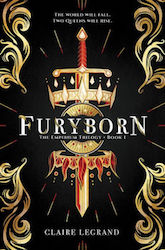 I’ve fallen hard for some not-genre books this spring (Alexander Chee’s How to Write an Autobiographical Novel, for one), but the first book I finished this year hasn’t left my mind since: Leni Zumas’s Red Clocks. This is the kind of speculative that feels too real: In a small Oregon town, several women’s stories overlap, their relationships with kids and the future all shaped by what they are and aren’t allowed to do with their bodies following the reversal of Roe v. Wade. Zumas writes with great empathy, and though her prickly, unfulfilled, complex characters are all struggling, her book is carefully weighted to make you think (and feel) without ever fully losing hope.
I’ve fallen hard for some not-genre books this spring (Alexander Chee’s How to Write an Autobiographical Novel, for one), but the first book I finished this year hasn’t left my mind since: Leni Zumas’s Red Clocks. This is the kind of speculative that feels too real: In a small Oregon town, several women’s stories overlap, their relationships with kids and the future all shaped by what they are and aren’t allowed to do with their bodies following the reversal of Roe v. Wade. Zumas writes with great empathy, and though her prickly, unfulfilled, complex characters are all struggling, her book is carefully weighted to make you think (and feel) without ever fully losing hope.
Rin Chupeco’s The Heart Forger, the sequel to The Bone Witch, left me in a sheer state of What? What… what do I feel right now I don’t know someone please help I need to understand!!! And I mean this in the best way: it expands on the world Chupeco built in The Bone Witch, answers some questions, but leaves the reader with a thousand more questions. This isn’t a series to pick up in the middle: Go find The Bone Witch now, so you’ll be ready for The Shadowglass come March.
Claire LeGrand’s Furyborn is a big, hefty fantasy and the start of a trilogy with a whole lot of complex worldbuilding—angels, assassins, prophecies, elemental powers, countries-at-war, and more. At the heart of LeGrand’s world—worlds, really, since Furyborn takes place in two timelines, and the world changes a lot from one to the other—are two angry, powerful, hotheaded, stubborn young women, connected across time and by fate, destined to save the world … or destroy it. Like Chupeco’s series, Furyborn doles out tantalizing pieces of the story out of order, so you know just enough to start to draw conclusions, only to have them enjoyably shattered by subsequent events. I love that feeling in my reading and can’t wait to see how this all plays out.
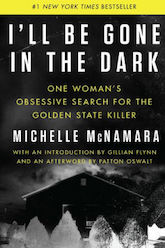 Despite it being only halfway through 2018, I have to call it now that my best reading experience of the year has been/will be Michelle McNamara’s posthumous true-crime work I’ll Be Gone in the Dark. It’s not SFF, but its dynamic between the haunted writer and her looming, then-faceless subject—night stalker-turned-rapist-turned-Golden State Killer—sounds like something out of a genre film. So do the details of this staggering case, like the time a future victim stood up at a town hall and claimed GSK couldn’t attack a woman if her husband was there… and then he did. What made this book especially gripping, however, was reading it mere weeks before the Golden State Killer was arrested—happening exactly as Michelle said it would in her harrowing “Letter to an Old Man” epilogue.
Despite it being only halfway through 2018, I have to call it now that my best reading experience of the year has been/will be Michelle McNamara’s posthumous true-crime work I’ll Be Gone in the Dark. It’s not SFF, but its dynamic between the haunted writer and her looming, then-faceless subject—night stalker-turned-rapist-turned-Golden State Killer—sounds like something out of a genre film. So do the details of this staggering case, like the time a future victim stood up at a town hall and claimed GSK couldn’t attack a woman if her husband was there… and then he did. What made this book especially gripping, however, was reading it mere weeks before the Golden State Killer was arrested—happening exactly as Michelle said it would in her harrowing “Letter to an Old Man” epilogue.
I waited longer than I should have to splurge on Emily Wilson’s incredible new translation of The Odyssey, which begins with “Tell me about a complicated man,” and couldn’t stop grinning at the new layers of meaning and feeling that she excavates. I’ve been struggling for years to complete a time travel play that I have slowly begun to realize is a sideways retelling of The Odyssey from Penelope’s perspective—and this book has been the key. Then Jen Wang wrote (and illustrated!) the fantasy story I wish I’d dreamed up in The Prince and the Dressmaker, an utterly charming graphic novel about Prince Sebastian throwing off royal obligations and throwing on fabulous frocks—made by his confidante and best friend Frances—to become the enchanting fashion icon Lady Crystallia. Huh, I’ve just realized that all of my favorite reads so far this year involve modern takes on heroic and villainous archetypes.
Borrowing Alex’s system of shout-outs for The Only Harmless Great Thing by Brooke Bolander (which wonderfully timed up with me learning about what the nuclear priesthood was, I love that kind of reading kismet); Starless by Jacqueline Carey; and Witchmark by C.L. Polk.
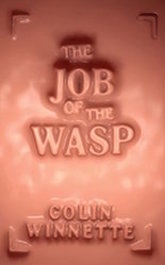 Most Extra: The Job of the Wasp by Colin Winnette!
Most Extra: The Job of the Wasp by Colin Winnette!
Winette looked at haunted house stories, locked-room mysteries, Victorian boarding school stories, and unreliable narrator-helmed psychological thrillers and was like, I WANT ALL THE THINGS. And thus, The Job of the Wasp was born, featuring a couple of unreliable narrators, a deeply disturbing boarding school environment, dead bodies turning up where you least expect them, and, if all that wasn’t frightening enough, fucking wasps.
Best Dragons That Are Both a Metaphor for Societal Collapse and Actual Living Fire-Breathing Bad-Ass Dragons: The Sky is Yours By Chandler Klang Smith!
Near-future reality TV star and heir to a fortune, Duncan Humphrey Ripple V is reluctantly betrothed to gothy Baroness Swan Lenore Dahlberg. Unfortunately, a couple of days before the wedding, he crashes his personal plane on an island full of garbage and falls madly in lust with a feral girl named Abby. The three soon find themselves on a hapless charge through Empire City, from silent libraries to prison to the sewers, all while evading the twin dragons that roil through the sky above, torching buildings at random. And while I loved all the characters, I have to say I loved the dragons the most by the end of the book.
Best Maximalist Work Celebrating An Older, Even More Maximalist Work: The World Only Spins Forward: The Ascent of Angels in America by Isaac Butler and Dan Kois!
This is my early pick for my favorite book of the year, and the one I’m most likely to reread repeatedly. I love it when a good oral history comes together, and this one has a particularly garrulous group of writers, actors, and theater folk who all want to tell their stories, at length, with incredible wit and empathy. And then you get to any page where Tony Kushner talks and it’s like he’s talking directly to you (at length) over a cup of coffee.










